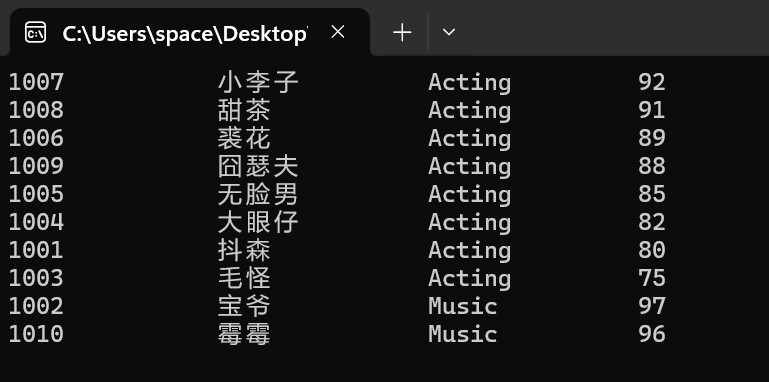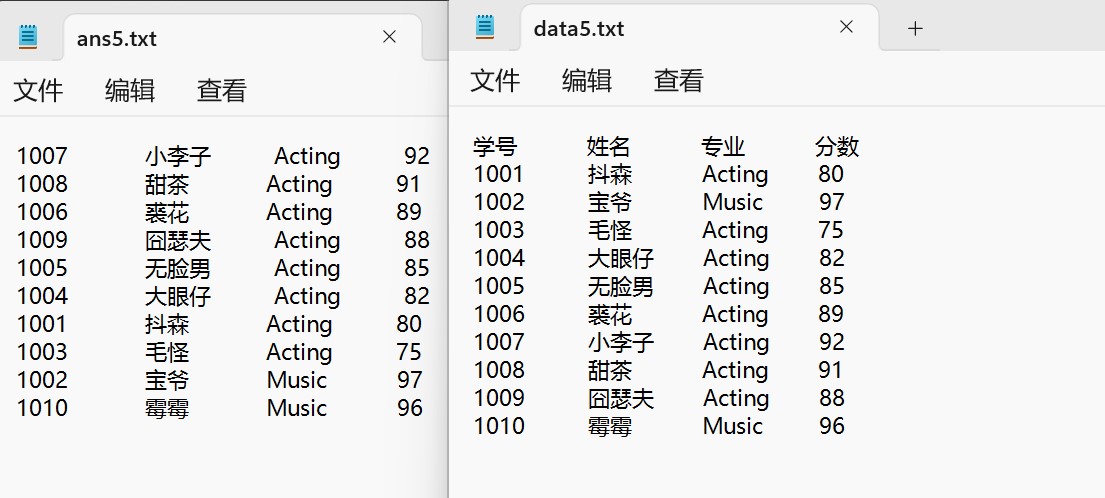实验6 模板类、文件I/O和异常处理
任务4:
Vector.hpp

#pragma once #include<iostream> #include<stdexcept> using namespace std; template<typename T> class Vector{ public: Vector(size_t n = 0) : size_(n) { if (n < 0) { throw std::length_error("数组大小不能为负"); } try { elements = new T[n]; } catch (const std::bad_array_new_length&) { // 重新抛出更合适的异常或者进行其他处理 throw std::length_error("数组大小不能为负"); } } // 构造函数,指定大小并初始化为给定值 Vector(size_t n, const T& value) : size_(n) { if (n < 0) { throw std::length_error("数组大小不能为负"); } try { elements = new T[n]; for (size_t i = 0; i < n; ++i) { elements[i] = value; } } catch (const std::bad_array_new_length&) { // 重新抛出更合适的异常或者进行其他处理 throw std::length_error("数组大小不能为负"); } } Vector(const Vector<T>& other):size_(other.size_){ elements = new T[size_]; for (size_t i = 0; i < size_; ++i) { elements[i] = other.elements[i]; } } ~Vector(){ delete[] elements; } size_t get_size() const {return size_;} T& at(size_t index){ if(index>=size_){ throw out_of_range("下标越界"); } return elements[index]; } T& operator[](size_t index){ if(index>=size_){ throw out_of_range("下标越界"); } return elements[index]; } friend output(const Vector<T>& v){ for(size_t i=0;i<v.size_;++i){ cout<<v.elements[i]<<" "; } cout<<endl; } private: size_t size_; T *elements; };
task4.cpp

#include <iostream> #include "Vector.hpp" void test1() { using namespace std; int n; cout << "Enter n: "; cin >> n; Vector<double> x1(n); for(auto i = 0; i < n; ++i) x1.at(i) = i * 0.7; cout << "x1: "; output(x1); Vector<int> x2(n, 42); const Vector<int> x3(x2); cout << "x2: "; output(x2); cout << "x3: "; output(x3); x2.at(0) = 77; x2.at(1) = 777; cout << "x2: "; output(x2); cout << "x3: "; output(x3); } void test2() { using namespace std; int n, index; while(cout << "Enter n and index: ", cin >> n >> index) { try { Vector<int> v(n, n); v.at(index) = -999; cout << "v: "; output(v); } catch (const exception &e) { cout << e.what() << endl; } } } int main() { cout << "测试1: 模板类接口测试\n"; test1(); cout << "\n测试2: 模板类异常处理测试\n"; test2(); }
运行结果截图

任务5:
task5.cpp

#include <fstream> #include <iostream> #include <string> #include <vector> #include<iomanip> #include<algorithm> using std::string; using std::ostream; using std::istream; using std::setw; using std::setprecision; using std::setiosflags; using std::ios_base; class People{ private: string no;//学号 string name;//姓名 string major;//专业 int score;//分数 public: People()=default; ~People()=default; int get_score() const{return score;} string get_string() const{return major;} friend ostream& operator<<(ostream &out, const People &c); friend istream& operator>>(istream &in, People &c); }; //重载<< ostream& operator<<(ostream &out, const People &c) { out << setiosflags(ios_base::left); out << setw(15) << c.no << setw(15) << c.name << setw(15) << c.major << setw(15) << c.score; return out; } //重载>> istream& operator>>(istream &in, People &c) { in >> c.no >> c.name >> c.major >> c.score; return in; } //专业按字典序排序 相同按分数排序 bool compare_by_order(const People &p1,const People &p2) { if(p1.get_string()<p2.get_string()) return true; if(p1.get_string()==p2.get_string()) return p1.get_score()>p2.get_score(); return false; } // 把vector<People>对象中的元素插入到输出流out void output(std::ostream &out, const std::vector<People> &v) { for(auto &i: v) out << i << std::endl; } // 把vector<People>对象中的元素写到filename文件中 void save(const std::string &filename, std::vector<People> &v) { using std::ofstream; ofstream out(filename); if(!out.is_open()) { std::cout << "fail to open file to write\n"; return; } output(out, v); out.close(); } // 从文件filename读取参赛选手信息到vector<People>对象 void load(const std::string &filename, std::vector<People> &v) { using std::ifstream; ifstream in(filename); if(!in.is_open()) { std::cout << "fail to open file to read\n"; return; } std::string title_line; getline(in, title_line); // 跳过标题行 People t; while(in >> t) v.push_back(t); in.close(); } void test(){ using namespace std; vector<People> v; load("data5.txt",v);//从文件加载 sort(v.begin(),v.end(),compare_by_order);//排序 output(cout,v);//输出到屏幕 save("ans5.txt",v);//保存到文件 } int main(){ test(); }
运行结果截图





